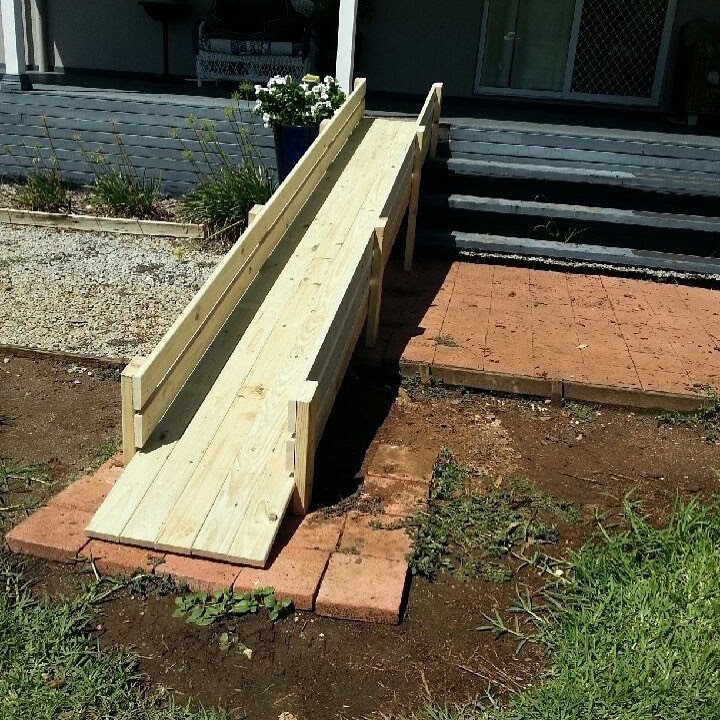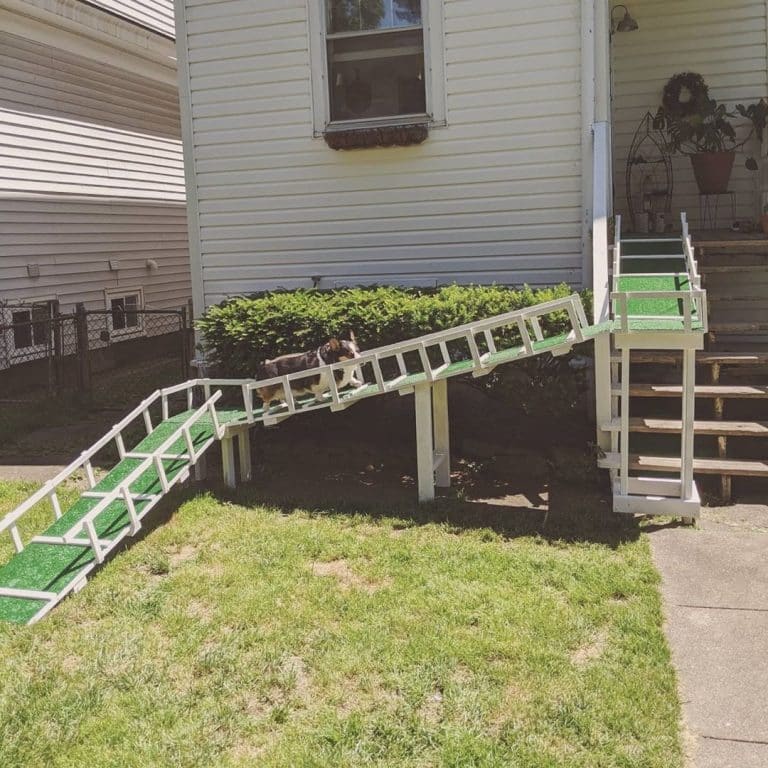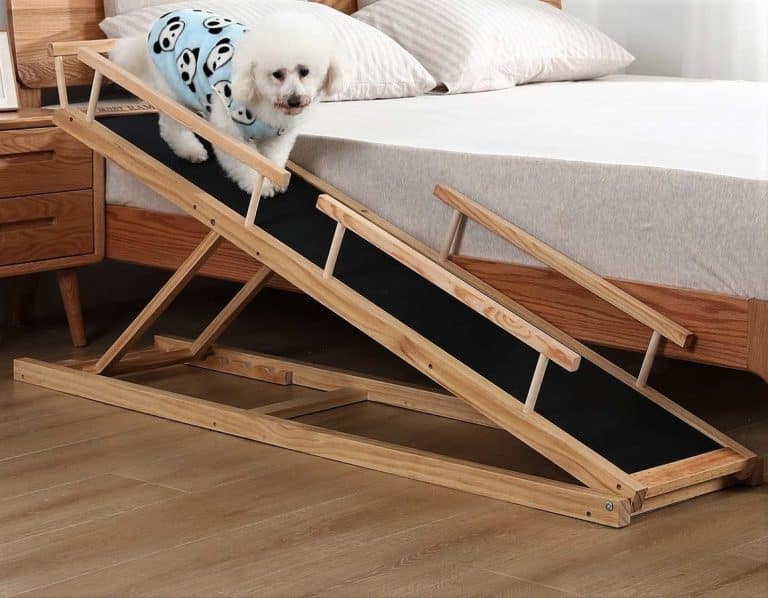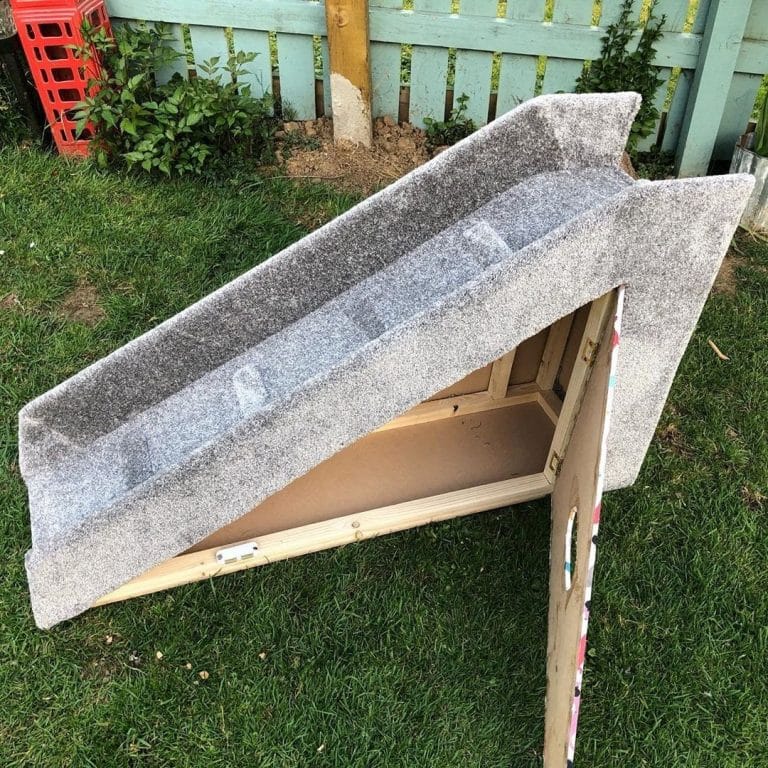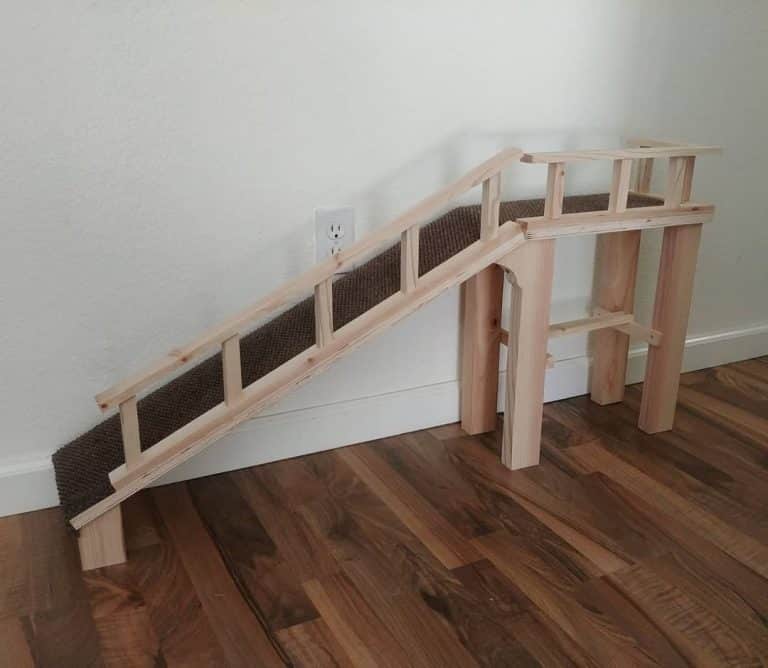Table of Contents
- 1 How to Build a Dog Ramp for a Deck—A Step-By-Step Guide
- 1.1 How to Build an Outdoor Dog Ramp
- 1.2 Items You Need to Build an Outdoor Dog Ramp
- 1.3 Building a Dog Ramp for Outdoors
- 1.3.1 Step One: Preparation
- 1.3.2 Step Two: Measuring
- 1.3.3 Step Three: Cutting
- 1.3.4 Step Four: Make a Base
- 1.3.5 Step Five: Make the Legs
- 1.3.6 Step Six: Add the Board
- 1.3.7 Step Seven: Beams on Top of the Board
- 1.3.8 Step Eight: Add the Side Rails
- 1.3.9 Step Nine: Adding the Carpet
- 1.3.10 Step Ten: Sanding the Ramp
- 1.4 What Makes the Perfect Dog Ramp
- 1.5 Why Do Dogs Need a Ramp?
- 1.6 Let’s Wrap Up What We Have Learned
- 1.7 References
How to Build a Dog Ramp for a Deck—A Step-By-Step Guide
Image source: hireahubbytamworth
If the stairs make the trip from the yard into the house too tiring for your pooch, it’s time for some changes. Dogs who suffer from disabilities and those who are are too old for a youthful escapade on the stairs need a dog ramp that will facilitate their daily activities.
If you are looking for a way to keep your dog’s joints healthy and protect them from possible falls and injuries, the ramp is a perfect solution.
We believe that the deck stairs have the greatest traffic, as your pooch probably leaves the house every day. In this article, we will give you instructions on how to build a dog ramp for a deck.
Take a day to make access to your home easier for your precious little pal. Let’s make a super-duper deck ramp for your pooch. Sleeves up!
How to Build an Outdoor Dog Ramp
You pooch enjoys playing and spending time outside but also loves to come to the deck during their short breaks and relax with you. How adorable is that?
While it is the dream of most dog owners to enjoy some quiet time with their pooch on the deck, you should know that the deck stairs pose a great danger for your doggo.
At times, the deck stairs can be slippery, especially in rainy seasons. If your pooch slips off from a high deck, the impulse of the impact can cause serious issues with dogs. They can end up with broken joints or ruptured spinal discs. Let’s prevent this from happening.
There’s a wide variety of dog ramps in stores, but you don’t need to buy a ramp if you don’t want to. Instead, you can build one on your own — they are relatively simple to assemble using plywood and boards.
Below, you will find our crash course on how to build an outdoor dog ramp in ten steps. But first, let’s see which items and material we need for this ramp making. Buckle up!
Items You Need to Build an Outdoor Dog Ramp
If you want to get down to ramp construction, you need to prepare your tools. This undertaking requires the following items:
- Drill
- Saw
- Galvanized screws
- Staple gun
- Waterproof glue
- Wood
- Carpet
- Pen
The Best Material for a Deck Dog Ramp
Image source: benbussell
The first thing you should consider when building a dog ramp is the material you will use. Dog ramps are usually made of:
- Plastic
- Metal
- Wood
Plastic ramps are not heavy, but they can’t be used for larger breed canines. You can build one for a Teacup Dachshund or Chihuahua, but a bulky doggo such as a German Shepherd shouldn’t test their weight on these ramps. The plastic ramps are useful for outdoors as they can’t get rusty. Our greatest concern is their instability, which is why we wouldn’t recommend you to build a deck ramp out of plastic.
This leaves us with wooden ramps. These ramps are stable and easy on the eye. Their flaw is that they tend to be slippery and can be rather heavy. If carpeted, wooden ramps are the perfect choice for a dog ramp for a deck!
Building a Dog Ramp for Outdoors
Image source: Amazon
Step One: Preparation
A sturdy and stable ramp is something you can make only with proper planning and a great deal of attention.
Before you start, go to the hardware store in case you haven’t acquired all the items you need yet. The material quantity depends on the deck height and width, as well as the slope you plan to make.
So, if you have a three feet high deck, for instance, you will need at least a thirteen feet deep ramp for a gradual slope and easy gradient. The longer angle you make, the more comfortable and stable your pooch will feel.
What you need is lumber that’s perfectly straight and in a nice condition. You will need it for making:
- Two long beams
- Several short beams (depending on the ramp length)
- Ramp walking board
- Four medium-length beams
Step Two: Measuring
You need to measure the height and length of your pooch’s future ramp before you start constructing it.
As for the ramp’s height, all you have to do is to measure the space from the top of the deck straight down to the ground. The width of the ramp depends on the size of your hairy friend. Based on the dimensions you have taken, you should decide on the length of the ramp. You can make it longer or shorter than your stairs, depending on your dog’s needs.
You must be careful with your ramps incline, as it should not be too steep. The shorter the ramp you make, the steeper the slope will be. You don’t want to build a ramp that poses a greater challenge to climb than the stairs. This refers especially to dogs who have a genetic predisposition towards spine issues, such as Dachshunds.
If you make the ramp too long, you will have problems with moving it, as the ramp will be too heavy.
Step Three: Cutting
The ramp measurements need to be marked on the lumber that you prepared. Use your pen to draw a cutting line. Cut the limber carefully.
Step Four: Make a Base
The next thing you should do is make a good and stable ramp base. The base is a part that should be placed on the ground. Take two wooden beams and place them parallel to each other. They need to be as far apart as your desired ramp’s width is supposed to be.
Now use small wooden beams in the same length and attach each of their tops to larger beams. We advise you to use as many of these small wooden beams to secure larger stability.
You need to use a saw to cut the beams according to your plan.
Step Five: Make the Legs
Use galvanized screws to assemble the front legs on your ramp. These legs should be made of wooden beams, and their purpose is to connect the base and the main walking board. Drill pilot holes for screws. Go slowly so as not to crack the wood!
Step Six: Add the Board
The walking board should be made according to your pooch’s size, like everything else so far. Align it with the rest of the construction carefully and use screws and waterproof glue to make it as stable as it can be.
Step Seven: Beams on Top of the Board
Take smaller beams whose length matches your ramp’s width. You will need them as a stronghold on the board. Line them up at the same intervals. Adding small wooden beams at every foot helps the dog not to slide down the ramp and hurt themselves. Your pooch will feel much safer and more stable.
These crossbars look like the ones made for chicken ramps. They are useful as they provide your dog with some traction.
Step Eight: Add the Side Rails
Now it’s time to use the remaining medium-length beams. Attach four small beams upright on each side of the board. Once you add all eight of them, attach transversely medium length beams in the position of the ramp’s rails.
We have found that these rails are extremely important for your pooch, even though lots of ramps are made without them. By adding the rails to your ramp, you’ll protect your dog from sliding off.
Our motto is—if there’s anything that can add up to your canine’s safety, do it!
Step Nine: Adding the Carpet
Another crucial moment in ramp-making is carpeting. The carpet needs to be attached to the board carefully so that it wouldn’t slip while your doggo uses the ramp. Put the waterproof glue onto the board’s surface and cover it up with carpet. Let it dry for a while. To make it even less slippery, we advise you to staple the carpet’s top and bottom ends with a staple gun.
Don’t let your pooch try out the ramp until you check if the carpet slides. Below, you will find why we consider the carpeting vital in ramp-making.
Step Ten: Sanding the Ramp
The ramp is finally constructed, and now it’s time to take extra precautionary measures to protect your furry one. Use sandpaper to smooth wooden surfaces. Your job is not done as long as you can feel the rough edges under your finger.
What Makes the Perfect Dog Ramp
Image source: marksmakesglasgow
There are hundreds of different guidelines on making a dog ramp for a deck, but it’s essential to follow the proper ones. For example, some dog owners lean a wooden board against the deck and think they helped their dog. But this is not the way to go!
Even in our good intentions, lots of things can go wrong. Unless you secure your pooch’s ramp and make it as sturdy as possible, it will become a great danger for them. Let’s go through the key features that make one dog deck ramp perfect.
Carpet
The carpet is used to cover the slippery board surface and protect your dog from sliding off the ramp. The choice of carpet is important, as it should provide your pooch with a stable footing. Canines who don’t feel stable on the ramp will refuse to use it, and their training to go up and down the ramp will be futile.
Try to find the carpets that will dry off fast after rain, such as marine grade carpets. Thus, you’ll prevent soaking and reduce the risks of mildew. You can combine carpets with non-slip matting for extra stability. Synthetic turf for more grip is also a nice solution, and it can be a pretty sight for your eyes, too!
Don’t use a slick material to cover the ramp. It is scary to even imagine such a ramp, but believe us when we say—we’ve seen it! Bear in mind that you are not making a slide but rather a stable construction to walk on.
Board
Try to find lumber that’s resistant to rot, mildew, decay, and rain. This is extremely important in case you cover the wood with carpet. If the carpet soaks up with water, lumber will deteriorate relatively fast. Eco decks can be a suitable choice.
Ramp Support
The ramp needs to be placed and hard-set on strong brackets for great stability. You can use steel brackets for extra safety. Timber screws can also go into the support beam under the deck.
Side Rails
We advise you to put side rails on the ramp. Dogs tend to lose stability, and they can easily slide off the ramp and gain injuries. Ramp edges can have one or more rails, but the bottom rail should be obligatory.
Solar Lights
Solar lights can be a nice and useful addition to your work of art. If you are building the ramp for a senior doggo, they could struggle with more than just back issues. Your dog’s vision could be impaired too, which will make using the ramp a bit more difficult for them.
Solar lights turn on as your dog approaches them, so even in the dark, they will be able to stretch their legs. Consider adding these solar lights near the ramp.
Ground
Make sure you put the ramp on even ground. If the ramp’s base is placed on uneven terrain, it will shake as your dog climbs up or down, which will make them feel unstable.
The bumpy ground can make difficulties even with the upper ramp part. If you leave it on such land, you will not be able to completely secure the top of the ramp with the first level of steps.
Assembling
The perfect dog ramp for decks is assembled with various tools that provide stability. Duct tape should not be the only tool for putting pieces together. Not only do they make the ramp shaky, but your gorgeous beastie can chew on it and make the whole construction even more unstable. And you don’t want your ramp to be wobbly, right?

All the corners must be angled according to your plans and the dog’s needs.
Why Do Dogs Need a Ramp?
Image source: blackhillworkshop
The need for a dog ramp stems from the dogs’ back problems, which can be caused by:
- Aging
- Acute injury
- Intervertebral Disc Disease (IVDD)
Aging affects your dog’s life habits. As time passes by, our canines’ backs slowly deteriorate. Bone frailness can be caused by their lifestyle or nutrition. Once they get older, you will notice that they can’t do the same things they performed with ease before. One of the first signs of back issues will be aggravated stairs climbing.
Arthritis is an issue typically seen in senior canines, but it can also strike younger munchkins due to problems with bone development. It is a condition that brings a lot of discomfort to your dog and affects their movements.
Your task is to find a way to adjust your home to your dog’s needs. The first step is to provide them with a way to avoid using the stairs. The dog ramp is a perfect choice for that, and it will be both yours and your pooch’s salvation.
Acute injuries are dangerous for any dog. Canines who have had their bones broken, or have gone through surgeries, shouldn’t make any sudden moves. Even when their wounds heal, these easily weak spots always pose some danger. You need to minimize the chances for any clumsy move, and using the ramp will reduce their chances of getting hurt.
Intervertebral Disc Disease causes the dog’s spinal disk age more rapidly than usual. It occurs most often in dwarf breeds, such as Dachshunds, who are prone to back problems. This nasty condition can lead to:
- Great pain
- Paralysis
- Loss of limb function
For those who suffer from IVDD, it is crucial to purchase or build a dog ramp! Deck dog ramps are the most important ones as your dog leaves the house almost every day. While you can find a way around the stairs in the house, deck stairs are more challenging. We don’t recommend you to lift and carry your pooch up and down the stairs, as the owners can also cause pain to their hairy pals if they don’t hold them properly.
Let’s Wrap Up What We Have Learned
In this article, you could have seen one way of making a deck dog ramp. There are others, of course, but we advise you to stick to some of the most important guidelines mentioned here. These outside ramps should be:
- Made of wooden material
- Covered with non-slippery carpet
- Made with a gradual incline
- As sturdy as possible
- Made with side rails
Need a ramp for inside the house, or prefer to buy a premade ramp to use on the deck? Check out our ramps below:
References
- https://en.wikipedia.org/wiki/Dog_health
- Jensen, V. F., and K. A. Christensen. “Inheritance of Disc Calcification in the Dachshund.” Journal of Veterinary Medicine Series A, vol. 47, no. 6, 2000, pp. 331–340., doi:10.1046/j.1439-0442.2000.00297.x.
- Beauchesne, Ryan. Crusoe, the Celebrity Dachshund: Adventures of the Wiener Dog Extraordinaire. St. Martins Griffin, 2015.

80% of Dogs Develop Arthritis or Joint Pain by 7 Years old – Here’s How to Protect Them
Most of us train our dogs when they are puppies to jump up on furniture. We think it’s harmless (and easier than always lifting them), but for dogs, couches and beds are very high compared to the size of their bodies.
Every time they jump it compresses their back and applies enormous force to their joints.
It’s no wonder that an incredible 80% of dogs experience arthritis or joint pain by only 7 years old.
Luckily, there is a vet-recommended solution.
It’s the PawRamp by Alpha Paw. An adjustable ramp that allows dogs to safely get on and off couches and beds. PawRamp makes joining you in bed or on the couch effortless and fun.
As a bonus, you can use code SAVE35 to get $35 off the PawRamp today.


